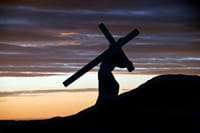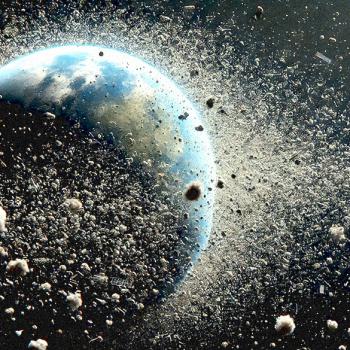 By: Sr. Rose Pacatte, FSP -- May 20, 2009
By: Sr. Rose Pacatte, FSP -- May 20, 2009
In April 1999 I was at a religious education conference in Indianapolis. With some time to spare I went to see The Matrix. I was exhilarated, inspired, wowed. I felt that mainstream cinema was changed forever, both in content and form. Science fiction was reborn. Larry and Andy Wachowski were my heroes. The search for life's meaning through cinema was alive and well.
In The Matrix, the filmmakers created a possible future where stylized violence became an art form to characterize the human struggle with self, neighbor, society and the divine, in the search for meaning. They cast far and wide for cultural, literary, religious, and philosophical references. At the end, any science fiction film worth the name, asks: who am I, why am I here, and where am I going?
A friend recently told me that he defines spirituality, that yearning to be in relationship to God and others, as the continuous search for meaning.
Ten years after the release of The Matrix, I am meeting high school religion teachers and youth ministers who tell me their students have never seen The Matrix (never mind Le voyage dans la lune!) They must use more recent films as a reference to explore humanity, social issues, existential meaning, theology, and spirituality in the science fiction genre.
Do the summer sci-fi films of 2009 provide this table of scientific fantasy, fiction, and speculation about problems challenging the world? Can we gather around these movies and talk about what it means to be human by looking at what does not? Are these films, in any sense, religious?
Captain Kirk's journey in Star Trek 2009 matures in the midst corn fields, that cinematic womb where other universes or extensions of our own, are born (think Signs, Superman, even Field of Dreams.) Star Trek may be sci-fi but it is also "psy-fi" because it deals with character, empathy as a core human value, self-discovery and identity, emotional intelligence, and the integrated personality. Star Trek is a vast playground. It is a lot of fun watching the characters mature, take responsibility and try to figure out the right thing to do. It asks: if I were to look in the mirror and see myself in one hundred years, would I like what I see? It falls into comic book mode, or a space western, when vengeance comes into play. It has its moments, but I would not rate this particular Star Trek "high" sci-fi on the existential meter.
Terminator Salvation, the fourth film in the iconic franchise, confronts a futuristic post-Apocalyptic world in ruins. Skynet, the computer protection system created to protect the U.S., becomes self-aware (a plot intersect with The Matrix), and turns all of its machine power on the human beings it is supposed to protect. A hero rises up: John Connor (played by Christian Bale; note the initials: J.C.) If the film follows through from the previous films, it will confront the choices humans make about how they resolve conflicts and the consequences of refusing dialogue, empathy, and negotiation.
Terminator II is my favorite of these films because The Terminator character, in true sci-fi fashion, morphs from the bad guy (Terminator I) into the one who lays down his life for another. Although I have not yet seen Terminator Salvation, it looks as though the characters continue to search for a lasting peace so earth can sustain life. Someone, or some "thing", will make the ultimate sacrifice.
What shall we say about Harry Potter and the Half-Blood Prince? Is the Harry Potter series true science fiction or science fantasy? I think it is probably science fantasy because it is imaginative, uses wizard science to transcend the laws of nature in the Hogwarts world, takes place in a parallel universe, explores the meaning of life, and searches for, yearns for, the existential reality and transcendence of human love (this story contends with adolescent hormones as well). Thus, while not religious per se, there are seeds of the Gospel in Harry Potter regardless of the genre, however contested.
Then there is Angels & Demons, the sequel to The Da Vinci Code. Certainly it is a work of fiction that takes place in the world of Catholic Christianity. Despite the fact that Catholicism may seem like an alternative universe to many, it exists in the real world. The film sets up a contest between faith and science, but it is one that no longer exists in the Catholic Church (Pope John Paul II reinstated Galileo in 1984; the Vatican Observatory was founded in 1774 and the Pontifical Academy of Sciences was founded in 1936). Angels & Demons has a subtext that seems to ask viewers to consider the consequences of scientific discoveries that no one can control and that re-creating the moment of creation might be considered the summit of brilliance or the height of human hubris. The Da Vinci Code had no heroes, however. Angels & Demons has several, as well as humility, faith, and a touch of inspiration.




